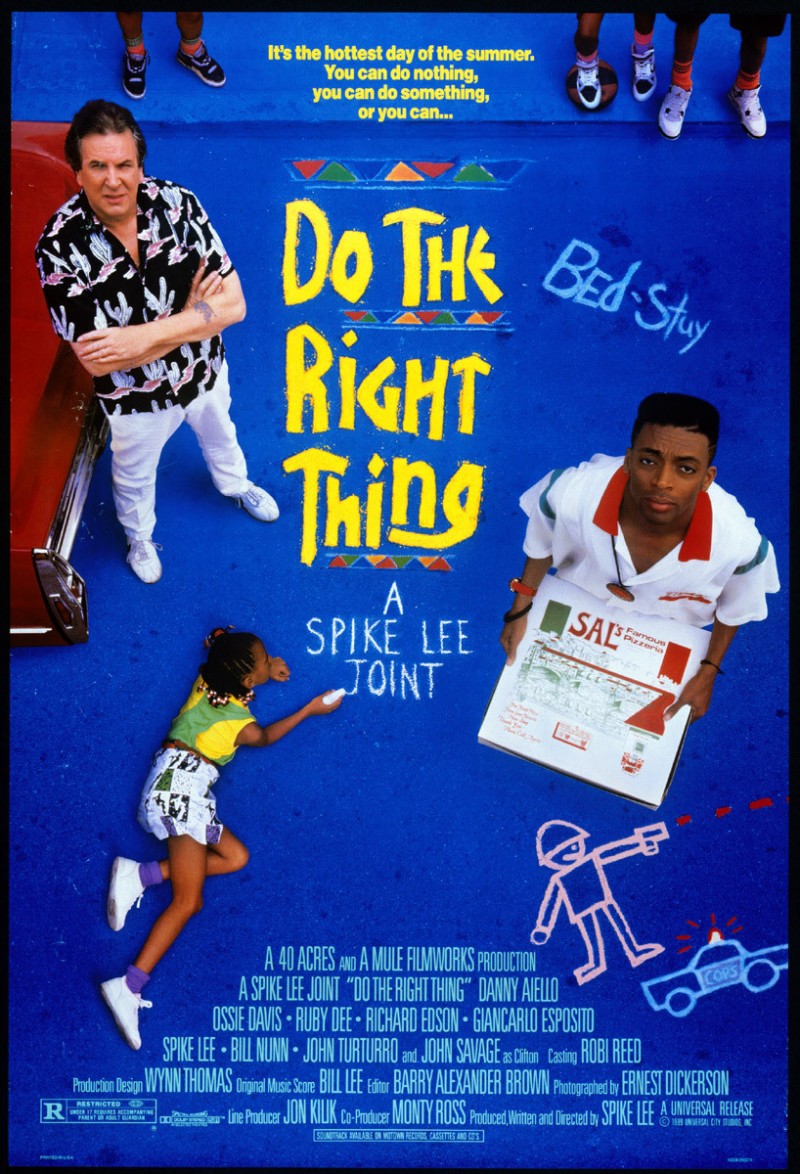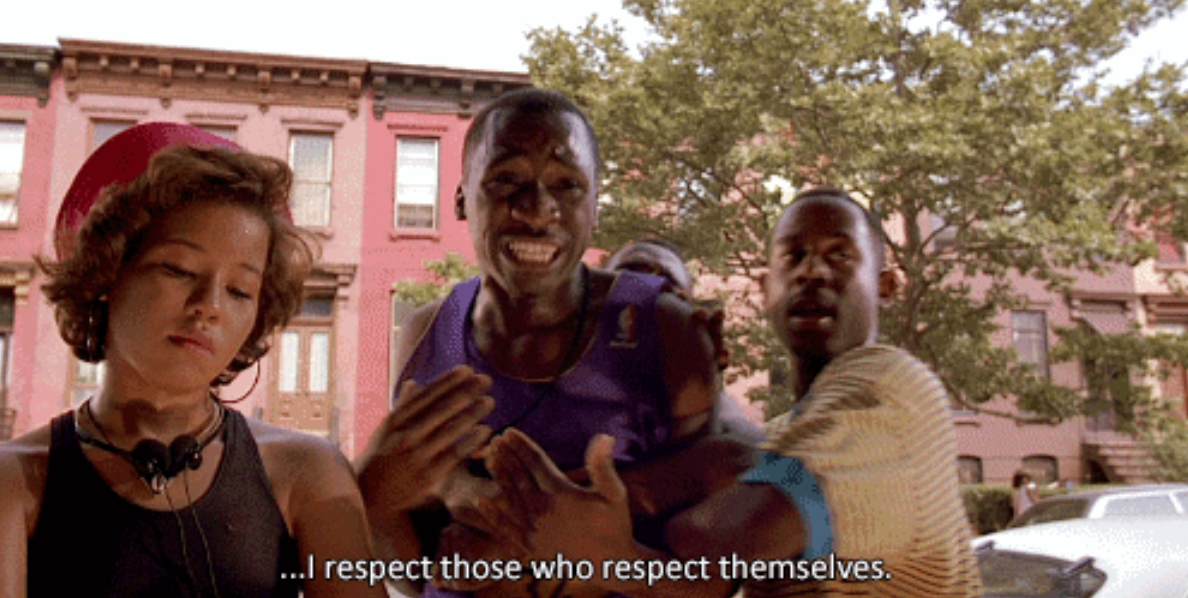Black History Month: Do The Right Thing (1989)
 Friday, February 20, 2015 at 9:34PM
Friday, February 20, 2015 at 9:34PM Our Black History Month celebration (through an Oscar lens) continues with Matthew Eng on Do The Right Thing's Screenplay
 Whenever I think about Spike Lee’s Do the Right Thing, and I’ve thought about it with depressing frequency this past year as I’m sure many cinephiles and non-cinephiles alike have, I often think about one of two things. One is inarguably the greatest opening credits sequence of all time because it’s still such a resilient, red-hot act of hip-hop aggression and because the under-heralded national treasure that is Rosie Perez is never too far from my mind.
Whenever I think about Spike Lee’s Do the Right Thing, and I’ve thought about it with depressing frequency this past year as I’m sure many cinephiles and non-cinephiles alike have, I often think about one of two things. One is inarguably the greatest opening credits sequence of all time because it’s still such a resilient, red-hot act of hip-hop aggression and because the under-heralded national treasure that is Rosie Perez is never too far from my mind.
The second is a tiny, wordless connection that plays out at the end of a mid-film scene between Ossie Davis’ elderly, self-appointed voice of the community Da Mayor and Christa Rivers’ Ella, the lone girl within the comedic teenage foursome that we see running around throughout the course of the movie. In the scene, Ella’s friend Ahmad (Steve White) has just lambasted Da Mayor for daring to criticize the behavior of he and his friends since he himself is a drunk and irresponsible vagrant whose infamous reputation is old news within their Bed-Stuy neighborhood.


Ahmad is eventually pulled away by his other friends, leaving Ella alone with Da Mayor, now freshly humiliated. All Ella does is look at Da Mayor, but it’s a look so loaded with empathy, apology, and understanding that although neither of these characters will directly meet each other again and even though the film has much louder episodes and more striking exchanges to spare, this moment remains quietly and unusually indelible.
This brief interaction plays out a little differently in the script than it does in the actual film, but for me it’s the one that best captures the spirit of Do the Right Thing as an unconventional, episodic, and street-level look at the ordinary encounters and seemingly insignificant communications that best epitomize what it’s like to be a scattered, active member or a deep-rooted denizen of a larger, ever-shifting community. Lee knows he doesn’t need to overproduce conflict in order for this story to pack the dramatic, thematic, and emotional punch that is inherent in its climactic riot and so he allows any and all discord that exists within the script to derive from its inhabitants and their ensuing circumstances: Buggin’ Out’s righteously-mobilized outrage over the Wall of Fame; Tina’s last-straw exasperation at being shut-in with a baby whose unreliable father is incapable of meeting her even halfway; Pino’s corrosive fury over both the family he can’t escape from and the family he only recently realized he was stuck with.
Amid these more prominent hostilities, however, Lee also makes time for the sort of stray, one-off interfaces between random neighbors that firmly root Do the Right Thing within its time and place: Jade playfully chastising Mother Sister over her own constant chastising of Da Mayor as she helps her with her hair; the musical battle of wills that plays out on two dueling boomboxes between a group of Puerto Rican men and a victorious Radio Raheem; the clear fondness that Sal exhibits towards Jade, which equally unsettles both Mookie and Pino, but also the quick instance of well-acquainted kindness that Sal exhibits towards Da Mayor by paying him to sweep the front of his pizzeria, against the groaning objections of his perpetually rankled eldest son.
Many of these dialogues, relationships, and behaviors really click onscreen under Lee’s frisky, focused direction and among his far-reaching ensemble, and it’s worth wondering, for example, whether or not the rancor and reconciliation between Da Mayor and Mother Sister would have been nearly as poignant without two bonafide legends like Davis and Ruby Dee in the roles, or if Mookie would have nearly the same effect with an actor lacking even an ounce of Lee’s experiential heft. Nonetheless, it all began on the page and bravo to Lee for never denying his characters the erratic messiness of an everyday existence, a bold writerly tendency that has admittedly payed uneven dividends in some of his later work on more than a few occasions. Here, however, Lee builds beautifully from this impossible sense of messiness, evoking the day-to-day frictions that aren’t exclusively racial but also filial, fraternal, sexual, generational, cultural, etc. The neorealist character concepts (i.e. centralizing Mookie yet keeping him relatively inconspicuous), the “day in the life” device, the Greek Chorus of riotous corner men with their “There Goes the Neighborhood” commentary, and the inspired lifting of Robert Mitchum’s iconic “Love - Hate” speech from Night of the Hunter all work towards something larger than their own referential qualities and contribute to a whole that’s far more ambitious than simple homage or empty pastiche.

I’m loath to bring up the Academy in this piece or even in any discussion about Do the Right Thing, since the raw deal the film notoriously received twenty-five years ago remains an almost legendary note of notoriety within Oscar’s annals. Those piddling two nominations are an obvious parallel to what’s happened to Selma this year, although the Academy, at the very least, had the good sense to recognize two distinctive and worthy elements within Do the Right Thing (even though it probably should’ve been Davis sitting in the Dorothy Chandler Pavilion that night), as opposed to tossing Selma a Best Picture nomination in addition to a deserving citation for one of the more expendable awards that only makes the larger honor seem even more broadly dubious.
I hope Selma will have the same staying power as Do the Right Thing, which has quickly become as much of a film school syllabus staple as Citizen Kane or Metropolis. (It’s been a viewing selection in five of my courses.) Any and all aspiring filmmakers should look at and learn from Lee’s film, but a lot of budding (and frankly established) screenwriters could learn a thing or two from Lee’s script about how you can draw together an eclectic and ethnically-diverse array of characters without just haphazardly smashing them into one another. Or how portraits of a divided community, city, or country need not be dour case studies in rigid dichotomies. Or how stories inextricably rooted in issues and conversations of race can be just as vivid, surprising, and multitudinous as the people these issues and conversations concern.
One of Do the Right Thing’s most subtly intriguing scenes is also one of its most outright hilarious, as Giancarlo Esposito’s zealous, shock-haired Buggin’ Out faces off against John Savage’s yuppie ignoramus for scuffing his Air Jordan after rudely bumping into him with his bike. It’s a hysterically relevant scene, still waving its finger in the face of encroaching gentrification, but it also offers a sly rejoinder to our own initial expectations of violence, which Buggin’ Out ultimately rejects, in spite of the incessant goading of the pack of people around him, which includes Ella, Ahmad, and their friends. On top of that, the scene is even more comically incisive when it comes to the rights of ownership, the privileges and pitfalls of a neighborhood in flux, and the knee-jerk protectiveness and instinctive togetherness of a community, which, for Lee, can simply not be felt in some lofty brownstone but is instead experienced on the streets and sidewalks on which everyone is just trying to stay on their feet.
 It is a testament to Lee’s refusal of any easy answers or facile moralizations that one of his film’s more diverting episodes can be so funny, so farsighted, and yet pack so many meanings, so as to remind us that nothing—and no one—is ever merely one thing.
It is a testament to Lee’s refusal of any easy answers or facile moralizations that one of his film’s more diverting episodes can be so funny, so farsighted, and yet pack so many meanings, so as to remind us that nothing—and no one—is ever merely one thing.

Previously on Black History Month
Song of the South (1947), Sounder (1972), Endless Love (1981), Street Smart (1987)



Reader Comments (5)
Matt: Aiello's probably a little TOO good to not deserve it, so I'd argue instead for Aiello AND either Davis, Esposito or both (with Akroyd or/and Brando getting passed over), depending on whether your preference is subtlety or raw energy.
This is my favorite movie of all time. I love it for all the reasons you give, plus one more. I grew up in NYC through the 70s & 80s and the seemingly irrelevant interactions and travel back and forth within the neighborhood was so much a part of my own childhood that this movie spoke immeasurable volumes to me. I would have been fine with noms for Aiello, Esposito and/or Davis. They were all magnificent. Glad to see you give this film some love.
Such a good movie. God bless Spike, Rosie, Ruby, Ossie and Sal's. And hey, god bless Kim Basinger, too, for ensuring that Do the Right Thing was the movie people were talking about the morning after the '89 Oscars.
Only his third feature (like Scorsese's Mean Streets). 25+ years old and still holds up.
Mike - Basinger doesn't get enough credit for that. it was seen as kinda petulant if i recall but it's important to remember that the nominations rarely tell the whole story!